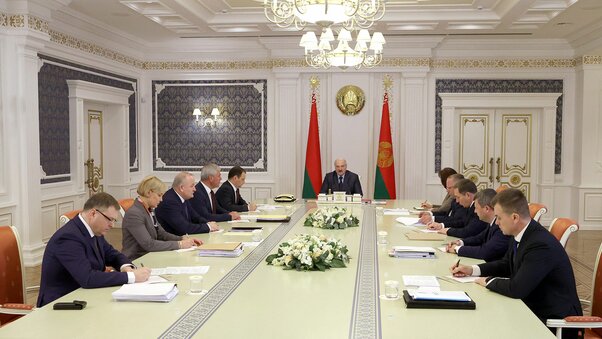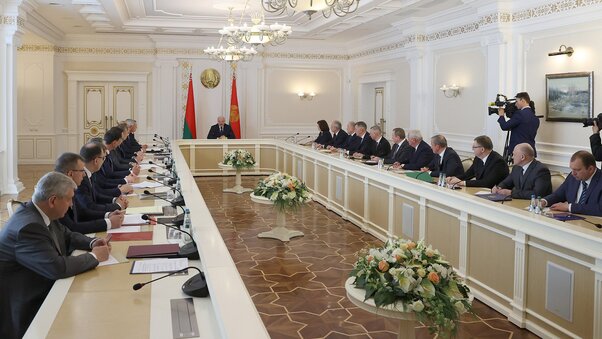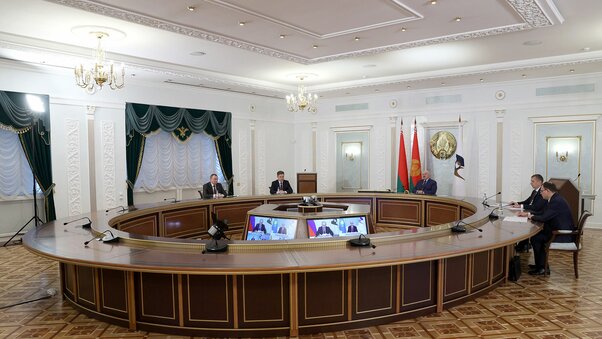Meeting to discuss response to sanctions
- 14
- 12:43
The use of sanctions to put pressure on a sovereign state is lawlessness and blackmail on an international scale, Belarus President Aleksandr Lukashenko said at a meeting to discuss response to sanctions on 6 July.
“Today we will discuss our response to the restrictive measures of the collective West in relation to our country. We should outline a strategy that will minimize their impact and keep us going. I have already said that there should not be any economic slowdown or downturn. This is out of the question. We should withstand it no matter what it takes. A war is going on,” Aleksandr Lukashenko said.
The head of state noted that sanctions remain the most prominent story for media projects and prompt adoption of various political declarations and legal acts. “However, these decisions have nothing to do with the legal system. In fact, the use of restrictive measures as an instrument to put pressure on a sovereign state is lawlessness and blackmail on an international scale. I remind you that blackmailing is condemned in the documents of the UN and other international organizations as an unacceptable measure,” the president noted.
“The fact that another package of sanctions against Belarus was introduced on the day marking the 80th anniversary of the beginning of the Great Patriotic War is incomprehensible. It can be explained by the fact that ‘democratic’ Europe advocating for the rule of law does not care about the people who suffered the most from the barbaric and inhumane invasion of European fascism, and does not bother about observing at least some decencies. Everything is clear: they have embarked on a new march to the East. This does not need extensive evidence. Sanctions were imposed not only on us. Even larger, more sensitive sanctions were introduced against the Russian Federation,” Aleksandr Lukashenko said.
According to the head of state, the Ryanair plane landing in Minsk was only a formal reason for sanctions. “It is as clear as day,” the president added.
The head of state emphasized that it is not about the emergency landing of the Ryanair flight in Minsk or the non-conformity of the Belarusian state system to Western standards. “They claim Belarus is a dictatorship. They planned all these ‘changes’ only with one aim: to make room for their own business. We have already seen the same happen in our southern neighbor Ukraine. They destroyed all Ukrainian enterprises, even agricultural ones. Ukrainian land is ‘golden’ and they laid everything to waste. They want to do the same to Belarus. They want no eliminate competition. This is one of the reasons to pressurize Belarus. Everyone knows that the sanctions are initiated by specific corporations that finance the political interests of certain Western figures. May of these corporations have a criminal history. So do political figures,” Aleksandr Lukashenko noted.
According to him, Western politicians are calling for finishing the Belarusian government and nation and turn the country into a source of raw materials for Europe. “However, they do not mention that the sanctions target not the Belarusian authorities, but the Belarusian nation, primarily working people. Their aim is to strip people of their income and throw them out. This is basically a punitive operation with a modern twist,” the head of state believes.
“Those who have chosen Belarus as a geopolitical target have forgotten that they are dealing with a nation that has been through a lot, but that has never been brought to its knees and that has never pleaded for mercy. This will never happen, and there is nothing that can bring us to our knees. Our nation has always fought for truth and justice. We will not become an expendable bargaining chip and will defend our sovereignty by all means possible,” Aleksandr Lukashenko stressed.
These principles should underpin the work of all participants of the meeting, the president pointed out.
Aleksandr Lukashenko went on saying: “We don’t want the Belarusian people to be hurt. It is the key thing for us. It is the government’s job to come up with effective measures to compensate for the losses and preserve jobs.” The president said he wanted a report on how Belarusian enterprises will be protected, how import substitution will be organized, and how domestic demand will be stimulated.
Aleksandr Lukashenko remarked that sales of Belarusian products in Europe had never been large, particularly sales of the products made by the enterprises the sanctions target: BelAZ, MAZ, and so on. “We imported some components from Europe. Are these components made only in the European Union? No. They are also made in the former Soviet Union, in the People’s Republic of China, and other countries. We just have to find new suppliers,” he believes.
Talking about individual European companies that sell their products on the Belarusian market, Aleksandr Lukashenko reminded that sales of products made by individual companies had already been restricted in Belarus in the past.
Aleksandr Lukashenko continued: “We know who in the USA, Germany, and other countries, particularly European ones, spoke against shipping parts and main components to Belarusian enterprises. We know them. We have the experience. Do you remember Skoda, Nivea, and so on? We told them: guys, thanks, see you later. First, we need to stop their sales in Belarus. Second, we need to stop the shipment of their goods via Belarus. The same measures should be applied to Germans. Let them ship their products via Finland to China and Russia. Or via Ukraine (there are good roads over there). May they go and sell their products there.”
“In other words, we need to take every measure to make them feel what Belarus is. I want them to think before using economic weapons,” the Belarusian leader stressed.
“The government and the National Bank should take a close look at the Western companies doing business in Belarus. Those, who show a responsible attitude and understand us, are free to cooperate with us. But if someone fails to understand us and has started a fight against the Belarusian state, you know how they should be dealt with,” Aleksandr Lukashenko said.
The head of state noted that Belarus has always honored its obligations in the field of nuclear non-proliferation, combating illegal migration, smuggling, and international organized crime. "Today we are dealing with these issues, but to the extent we find necessary, beneficial and financially possible," Aleksandr Lukashenko said.
"You see, our neighbors have started whining (primarily Lithuania and others there) about Belarus, saying that we are facilitating migration to Lithuania. Yesterday or the day before yesterday they announced that they would speed up the registration of those coming from Belarus [the time spent on processing of asylum applications]. Who do you send this signal to? If you declare to the whole world that you will register those who make their routes through Belarus even faster, they will keep going. You are opening the door for these migrants even wider," the Belarusian leader noted.
The president said that Belarus will continue dealing with the main challenges on the border. "But if someone thinks that we will close the border with Poland, Lithuania, Latvia and Ukraine and become a filtration camp for fugitives from Afghanistan, Iran, Iraq, Libya, Syria, Tunisia, they are mistaken at least. We will not hold anyone. We are not their final destination after all. They are headed to the enlightened, warm, cozy Europe,” the head of state said. “On the one hand, Europe invited them (there are not enough workers). On the other, they have destroyed these countries. They effectively ruined Afghanistan and withdrew their troops. You can see what is happening there: now the Central Asian republics of the former Soviet Union are barely holding back this flow of refugees."
"They reproach the Ministry of Foreign Affairs and our government for refusing to comply with the readmission treaty. They want to turn Belarus into a filtration camp: people are fleeing westwards because of grief, misery and war, and they want us to take them and hold them in ‘filtration camps’ here. This will not happen since you have chosen this policy with regard to Belarus and Russia. People flee the war and run to where they have been invited. The European Union pays allowances for those who arrive there," the president added.
“I am looking forward to hearing the proposals of the Ministry of Foreign Affairs on how to build relations with the countries that are beating the drum for wearing down Belarus. The Ministry of Foreign Affairs needs to respond more actively to any unfriendly moves in relation to Belarus. What retaliatory measures are to be taken if the sanctions keep snowballing? Let’s think about it,” the Belarusian leader said.
The president also asked about diplomatic efforts to counter sanctions in international organizations and international courts. “One gets a feeling that our diplomats are keeping a low profile and keeping their heads down. Why are we not going to court, and if we do why does our society not know about it?” Aleksandr Lukashenko said.
“We were not interested in such a turn in diplomatic relations with western states. And it is not for us to turn this story back. But life goes on. Fortunately, the modern world is much bigger than the borders of the European Union. Our economy is not that big to fret about these sanctions. We can sell the surplus that we have to the rest of the world,” Aleksandr Lukashenko said.
He pointed to significant untapped potential in trade with Russia, Asia, primarily China, Vietnam, India and Pakistan, as well as Africa, Latin America, the Gulf countries and the Middle East.
“These are dynamically growing economies, solvent markets, real competitors to today’s superpowers. At the same time they do not find fault with us and do not teach us how to live,” the Belarusian leader said.


